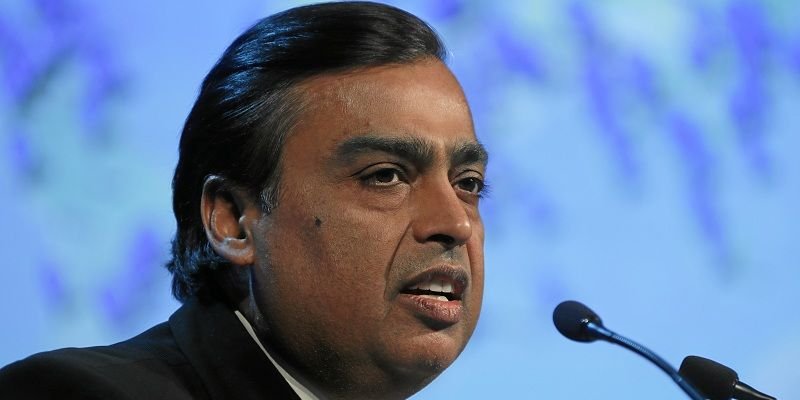Startup
India can become creator, exporter of AI tech: Mukesh Ambani, Jensen Huang at NVIDIA India Summit

India could become a creator and exporter of AI technologies, said Jensen Huang, Founder and CEO, NVIDIA and Mukesh Ambani, Chairman, Reliance Industries at the NVIDIA AI Summit India in Mumbai.
They said that through a partnership between NVIDIA and Reliance, the necessary infrastructure will be built in India to make this possible.
The first part of the session featured Huang sharing a forward-looking vision of computing. He emphasised that with Moore’s Law reaching its limits, the future lies in accelerated computing and AI innovation.
He also detailed how NVIDIA’s GPU architecture has evolved from democratising computer graphics to revolutionising AI computation with its Blackwell chip. NVIDIA is driving AI breakthroughs across industries such as quantum computing, 5G, and gene sequencing, he added.
Huang also highlighted the importance of deep learning, describing how AI is transforming the way software is written through “Software 2.0.”
“Software 1.0 was coding. Now, Software 2.0 is about using ML to observe mass amounts of data, and build a universal function approximator to get the expected output. Software is written by the computer,” Huang explained.
AI built in India, for the world
Joining Huang on stage, Ambani prophesied that AI could drive unprecedented growth across India’s major industries, noting that Reliance is already collaborating with NVIDIA to build AI systems that are deeply integrated with the company’s operations.
“India stands at the dawn of a new intelligence age. India can be an AI exporter, providing AI solutions to the world,” said Ambani, envisioning a future where India, with its growing expertise in AI, would not only build AI solutions for its domestic market but also export these solutions to other emerging markets.
Both leaders agreed that AI infrastructure is key to realising India’s AI-specific ambition. “At Jamnagar, we’re ready for a large-scale AI infrastructure,” Ambani said, referencing Reliance’s gigawatt-scale, AI-ready data centres in the Gujarat city.
The session with Huang and Ambani set the tone for the rest of the NVIDIA AI Summit, where thousands of top developers, AI/ML pioneers, and tech industry leaders came together for an immersive experience in the world of AI innovation.
The summit focused on key trends shaping the AI/ML landscape, including the next phase of generative AI, advanced AI for enterprise, conversational workflow development, software-defined vehicles, and more.
The summit also featured hands-on workshops on a range of topics, including deep learning, app development with Large Language Models (LLMs), transformer-based Natural Language Processing, efficient LLM customisation, accelerated data science, and more.
Startup
BrowserStack launches AI-driven Low Code Automation tool

Software testing platform has rolled out Low Code Automation, a solution to simplify test automation for quality assurance teams, developers, and non-technical users.
The newly launched solution will address challenges faced by software teams, including manual testing delays and complex automation frameworks, BrowserStack said in a statement.
While traditional test automation requires coding expertise by often limiting non-technical testers to contribute, this tool allows user—irrespective of their technical background—to create and manage AI-driven automated tests without writing code. Users can also use BrowserStack’s cloud infrastructure for reliable test execution.
“(The AI-powered Low-Code Automation (LCA) simplifies the process of building and maintaining test automation suites compared to traditional tools like Selenium. It reduces the steep learning curve and complexity often associated with automation projects, leading to a quicker return on investment (ROI),” Chintan Doshi, Director of Product Management at BrowserStack, told YourStory.
To support development teams worldwide, Low Code Automation speeds up testing cycles, boosts product quality, and enhances user experience by reducing technical barriers.
“Citizen testers—such as business analysts, product managers, and customer support teams—can easily add validations and create automated tests with the test recorder, without requiring coding skills. This reduces their dependency on developers and QAs and empowers them to actively contribute to testing efforts,” Doshi explained.
Founded in 2011 by Ritesh Arora and Nakul Aggarwal, BrowserStack provides a cloud-based platform for developers to test websites and mobile apps across devices, operating systems, and browsers on demand.
With headquarters in San Francisco and Mumbai, the company has expanded its product line to include over 15 products, of which 10 were launched in the past 18 months.
In August, the Accel-backed firm acquired Berlin-based Bird Eats Bug, an advanced bug-reporting tool. The acquisition aims to address the existing gaps in bug reporting and streamline fragmented testing workflows.
Startup
Flipkart’s delivery arm Instakart reports widening losses, lower revenue in FY24

Flipkart’s delivery service arm Instakart’s FY24 losses increased multifold to Rs 1718.4 crore, from Rs 324.6 crore in the previous year, hurt by higher expenses and marginally lower revenues.
The company, which is in the logistics, warehouse, courier and allied services business, clocked an operating revenue of Rs 12,115.3 crore in FY24, 5% lower than Rs 12,787.4 crore it posted a year ago, according to filings made with Toefler.
During the period, the company’s total expenses increased 6% to Rs 14,149.4 crore, mainly driven by employee benefit and other expenses.
Logistics services accounted for the majority (about 78%) of Instakart’s total operating revenues, with Rs 9,429.8 crore, marginally lower than what it collected in the previous year.
Warehousing services, which accounted for about 10% of total operating revenues, witnessed a 28.4% drop in revenue, while collection services, which accounted for 12%, remained stable.
Just a week ago, Flipkart Internet reported a 21% rise in FY24 revenue at Rs 17,907.3 crore helped by rising income from its advertising services.
Flipkart India Ltd, which is Flipkart’s business-to-business (B2B) arm, reported a 26.4% rise in revenue from operations at Rs 70,541.9 crore in FY24.
Startup
Google Cloud to boost support for early-stage AI startups with new programmes, partnerships

has rolled out a range of programmes and partnerships to accelerate the growth of AI startups In India. The initiatives, announced at an AI Startups Summit in Bengaluru, will support early-stage AI founders in building, scaling, and expanding their customer base through the utilisation of Google Cloud services.
The tech giant recently introduced Emerging ISV Partner Springboard—a 12-week programme designed to fuel growth for AI startups. Participants will benefit from hands-on support in creating go-to-market assets, consultations with Google AI experts for product refinement, guidance on technical architecture best practices, and streamlined onboarding to Google Cloud Marketplace.
“Google is committed to empowering AI startups to drive innovation and growth. These initiatives demonstrate our dedication to providing critical support and resources to early-stage founders, helping them build and scale successful AI-powered businesses,” said Manish Gupta, Senior Director, Research, Google DeepMind.
During a fireside chat at the Global Google Cloud Summit, Google Cloud CEO Thomas Kurian applauded startups leveraging AI and cloud technology.
“At Google Cloud, our mission is to support these pioneers by providing the essential tools, resources, and mentorship they need to thrive. Through strategic partnerships, tailored programs, and advanced infrastructure, we are committed to enabling businesses to scale their impact and drive the next wave of digital transformation,” said Kurian.
Early-stage founders will receive enhanced support through the Google for Startups Cloud Program, which will offer $200,000 in Google Cloud credits over two years. AI-based startups will receive even greater support, receiving $350,000 in credits to address the demanding computational needs of advanced AI development, the company said in a statement.
In addition, Google has collaborated with Y Combinator to provide exclusive access to NVIDIA H100 GPUs and Google Cloud TPUs, along with cloud credits, support, and mentorship for its Summer 2024 group of AI-focused startups.
Furthermore, the tech giant is also joining forces with early-stage accelerators and incubators such as 500, StartX, and Berkeley Skydeck to provide early-stage founders with a special package, including Google Cloud credits, expert advice, and technical workshops
Earlier, the California-headquartered firm also announced the launch of Startup School: GenAI, a four-week training programme designed to help startups leverage AI.
-

 Startup Stories1 year ago
Startup Stories1 year agoWhy Millennials, GenZs Are Riding The Investment Tech Wave In India
-

 Startup Stories1 year ago
Startup Stories1 year agoStartups That Caught Our Eyes In September 2023
-

 Startup Stories1 year ago
Startup Stories1 year agoHow Raaho Is Using Tech To Transform India’s Fragmented Commercial Trucking
-

 Startup Stories12 months ago
Startup Stories12 months agoMeet The 10 Indian Startup Gems In The Indian Jewellery Industry’s Crown
-

 Crptocurrency8 months ago
Crptocurrency8 months agoLither is Making Crypto Safe, Fun, and Profitable for Everyone!
-

 Startup Stories1 year ago
Startup Stories1 year agoHow Volt Money Is Unlocking The Value Of Mutual Funds With Secured Lending
-

 Startup Stories1 year ago
Startup Stories1 year agoWhy Moscow-Based Kladana Considers Indian SME Sector As The Next Big Market For Cloud Computing
-

 E-commerce1 year ago
E-commerce1 year agoTop Online Couponing Trends To Watch Out For In 2016




